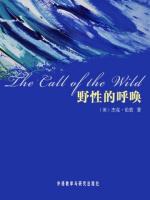Stuggle for life
Below is the review on The Call of the Wild whose author is Jack London. Jack was an American realist author whose magnum opuses are Love of Life, White Fang and The Sea-Wolf, as well as The Call of the Wild. Since his childhood, Jack had suffered great poverty and inequality of the society with a variety of experiences such as being a child labor, sailing as a helmsman and living a vagabondage life. Therefore, based on his rough life, his masterworks mostly reflect on the sufferings of the underclass and shout out their voices against the injustices at that time.
The Call of the Wild tells a story of Buck (a dog that is half St Bernard and half Shepherd), who at the beginning is just a naturalized pet but finally grows into the king of the wolves on a tortuous path. In my view, the growing of Buck can be divided into six stages and the turning points of each two stages are the most wonderful parts in the story.
At the first stage, Buck is highly civilized for he lives a comfortable and respected life at a big house in the sun-kissed Santa Clara Valley. Taken good care of by his rich and friendly master, he shows great loyalty to humans and never knows the danger of the wild. However, due to the unexpected accident, he is forced to adapt himself into the nature and follow the law of club and fang. The first turning point comes when the man in the red sweater lifts up the club and breaks Buck down in a cruel way, and what follows the death of Curly, which teach Buck an unforgettable life lesson and introduce him to the reign of primitive law. At the second stage, Buck has initially got to the new mode of life, being cunning and self-defended to live, or he will be killed to death. The second turning point is what we call the fight of the throne. Buck has a life-and-death struggle with Spitz and finally win the crown. At the third stage, he becomes the leader of the team and gradually integrates into the wild. He gains the respect and establish his prestige by risking his life, totally different from the respect he has in the sun-kissed valley. The third turning point is implicit as the condition of Buck goes down, accompanying with the one-by-one death of his partners due to the hard labor. The fourth turning point is the most heart-warming experience in Buck’s life. John Thornton saves his life and warm his heart with selfless love. At the fifth stage, Buck enjoys the “feverish and burning” mutual love with Thornton which is definitely different from the relationship with the judge’s family. But the wildness and wiliness coexist with his faithfulness and devotion to human and the strain of the primitive still beckons him. “Mankind and the claims of mankind slipped further from him day by day.” The fifth turning point is sad and heart-broken. Buck loses his John Thornton. The last tie has broken. He finally steps into the ultimate stage, being part of the nature and the wild.
Written in a perspective of third person, Jack endowed Buck with human qualities. Abundant personalities coexist in Buck. He is loyal and merciful, brave and proud. Meanwhile, he is also cold and competitive, cruel and cunning. And it’s the cruel reality that arouses the wild nature deep in Buck and contributes to his wonderful change. Jack tells the truth of the law of the jungle from a dog’s view. But it is further than that. In my view, it’s also Buck’s tenacity and quick adaptation to the reality that makes him survive from the hell and stand out from the crowd. What I learn from Buck is that we should temper ourselves through practice and stick to our targets no matter what we encounter in our life.



 京公网安备 11010802032529号
京公网安备 11010802032529号